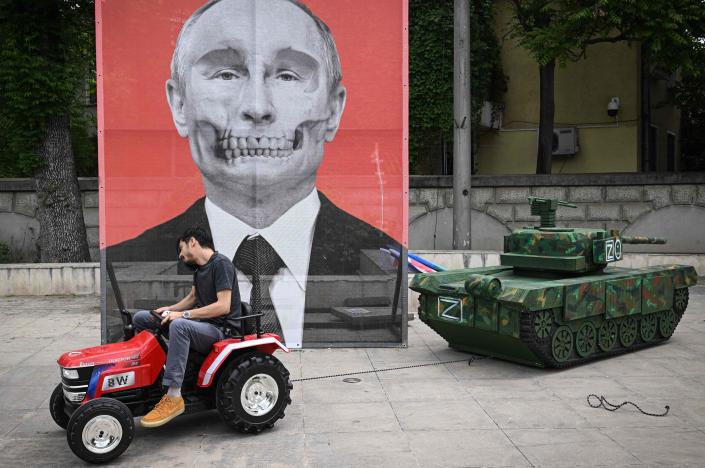Eight years in Vietnam.
Nine years in Afghanistan.
Twenty years in Afghanistan.
Eight years in Iraq.
Eight months and counting in Ukraine.
How long does it take for a great power to develop military amnesia?
Russia and America, the two former Cold War superpowers, should be better positioned than any other nation to understand the high costs – in money, equipment, reputation and worst of all lives – of fighting an extended war in which too many locals see you as murderous occupiers.
Lessons Russia should have learned
Among all nations, Russia should understand the danger of unpopular foreign intervention: For almost three years, from June 1941 to December 1944, Hitler’s Nazi army laid waste to large swaths of the Soviet Union during what Russians still call the Great Patriot War. The 872-day siege of Leningrad, Russia’s second-largest city now named St. Petersburg, was especially brutal. A million people died, most of them civilians, many from starvation.
Historians’ analyses of why Hitler’s Russia invasion failed carry eerie echoes of current experts’ analyses of the mistakes Vladimir Putin has made in invading Ukraine: There was poor strategic planning.
The Germans had no long-range plans for the invasion’s aftermath. Hitler believed that the Russians would capitulate quickly after the shock of initial losses. Most important, he failed to understand the primordial power of one word – “Родина” – for Russians: They were determined to defend their Motherland at all costs.
‘The Forgotten Army’ of WWII: D-Day 2022 spurs remembrance of 2.5M vital Allied Indian soldiers
And then there is America
Americans can go back further in history for what might be called our collective military memory: British troops fought George Washington’s army for nearly a decade before withdrawing in disgrace.
The British failure taught the American colonialists important lessons, lessons their descendants, unfortunately, would forget over time.
It’s why Washington, in his famous 1796 farewell address, prepared after decades of public service in the military and as our first president, warned against foreign entanglements leading to unnecessary wars.
It’s why Gen. Douglas MacArthur, two years into the U.S. postwar occupation of Japan, warned Congress: “History points out the unmistakable lesson that military occupations serve their purpose at best for only a limited time, after which a deterioration rapidly sets in.”
Five more years would pass before U.S. troops left Japan. And it would take 13 more years before the first American combat forces landed in Vietnam, starting an ultimately failed war and occupation that didn’t end until the fall of Saigon in 1975.
Fall of Kabul, fall of Saigon: Their horror was our horror
Checking on modern-day Ukraine
Now, for Russia’s brutal war in Ukraine, the deterioration MacArthur predicted began from the moment it invaded its neighbor this Feb. 24. Eight months later, Ukrainian soldiers are encircling Russian troops as they withdraw from key strategic positions.
Russian Defense Minister Sergei Shoigu said last week that 5,397 Russian soldiers had died in the war, a much lower figure than Western government figures.
More than 9,000 Ukrainian military personnel have died.
As of late August, the Kremlin had lost an astounding 12,000-plus planes, tanks, armored vehicles, guns and other pieces of military equipment worth almost $17 billion, according to one estimate.
KGB past: Vladimir Putin’s biography makes this dictator, and the Ukraine war, especially dangerous
The forced mobilization of new recruits Putin announced last month and the protests they sparked across Russia recall the Vietnam War draft that sent young Americans into the streets more than a half-century ago.


Russia’s new annexation of four Ukrainian provinces making up 15% of the country, following sham referendums enforced at gunpoint and celebrated by Putin in a darkly comical rally at Moscow’s Red Square, is a sign not of his war’s success but rather of its desperation, one that makes even more certain the failure of his occupation.
No nation more than Russia should have foreseen all of this. The Ukraine invasion started almost 33 years to the day when the last Soviet troops left Afghanistan to end a disastrous decade-long war and occupation there.
A quick history lesson in Iraq
On the day that the first American soldiers entered Iraq in March 2003, I landed in Moscow to see whether I could learn lessons for U.S. civilian and military leaders. In interviews with a dozen veterans of Russia’s Afghanistan debacle, I heard the same certain prediction captured in one vet’s memorable words: If America stayed long in Iraq, it would come home “like a whimpering dog with its tail between its legs.”
Opinion alerts: Get columns from your favorite columnists + expert analysis on top issues, delivered straight to your device through the USA TODAY app. Don’t have the app? Download it for free from your app store.
Just days after U.S. troops entered Iraq, Defense Secretary Donald Rumsfeld was declaring premature victory, telling CNN in an infamous burst of verbal bravado that they faced only “sporadic firefights from some dead-enders who don’t want to give up.”
More than eight years later, after losing nearly 4,500 troops, the U.S. occupation of Iraq ended in failure, just as the Russian vets had told me it would days after it began.
Military scholars can see clearly what sometimes blinds the civilian leaders of great powers. In his book “Occupational Hazards,” Georgetown University international affairs professor David Edelstein wrote: “Despite the relatively successful military occupations of Germany and Japan after World War II, careful examination indicates that unusual geopolitical circumstances were the keys to success in those two cases, and historically military occupations fail more often than they succeed.”
U.S.’s 0Botched Afghanistan withdrawal: Botched withdrawal scarred Biden’s presidency, plunged Afghanistan further into strife
Where do things go from here?
Putin appeared to have gotten away with his 2014 occupation of Ukraine’s Crimea region, which came during corrupt leadership in the neighboring country and prompted Western sanctions along with expulsion from the Group of Eight major economies.
Now Putin faces a united nation headed by a heroic leader in Volodymyr Zelenskyy, bolstered by billions in aid from the United States and other allies.


Zelenskyy’s path from comedy to tragedy: Can he save Ukraine from Russian invaders?
No one knows when it will happen, but the history of great powers’ military occupations suggests that Russian troops will eventually leave Ukraine in defeat. There are different scenarios of what will happen on the road to defeat, from Putin dying or being overthrown to him declaring a false victory and withdrawing to still more months of bombing and killing.
Following his nation’s monumental sacrifices, there is no chance that Zelenskyy will accept a negotiated peace that leaves the Kremlin in control of the territories it has seized. Putin’s veiled threat of using tactical nuclear weapons is the empty bluff of a poker player holding a weak hand.
The Kremlin’s final failure is in the cards for one simple but powerful reason: Russia’s will to conquer is weaker than Ukraine’s will to save its homeland.
James Rosen is a former Pentagon reporter for McClatchy who earlier covered the collapse of the Soviet Union as a Moscow correspondent. He received awards from the National Press Club, Military Reporters and Editors and the Society of Professional Journalists, which last year named him top opinion columnist.
You can read diverse opinions from our Board of Contributors and other writers on the Opinion front page, on Twitter @usatodayopinion and in our daily Opinion newsletter. To respond to a column, submit a comment to letters@usatoday.com.
This article originally appeared on USA TODAY: Russia, Putin ignored lessons of history by invading Ukraine




